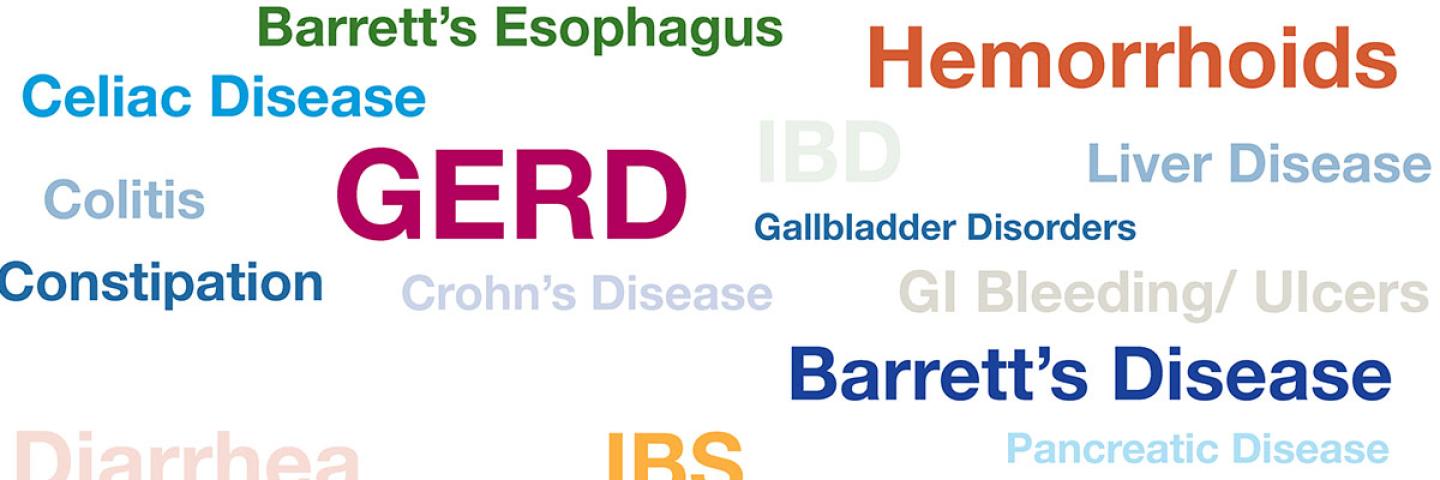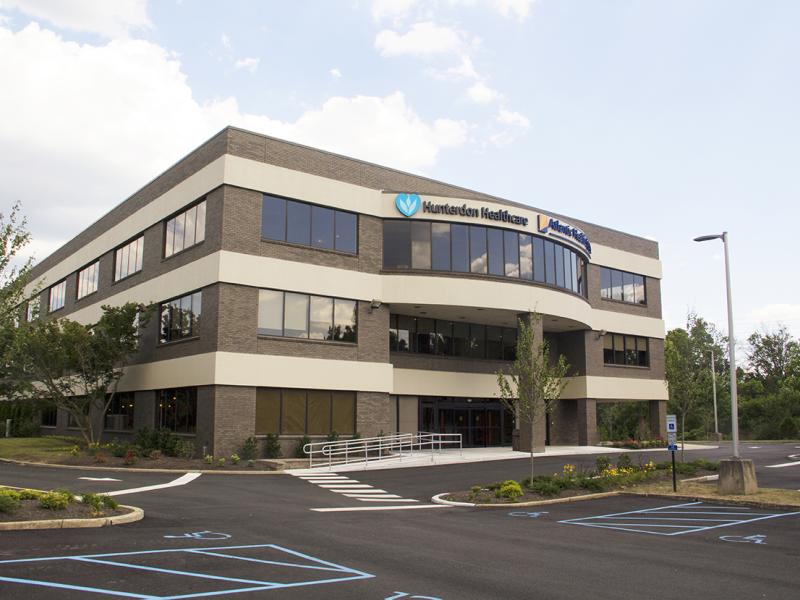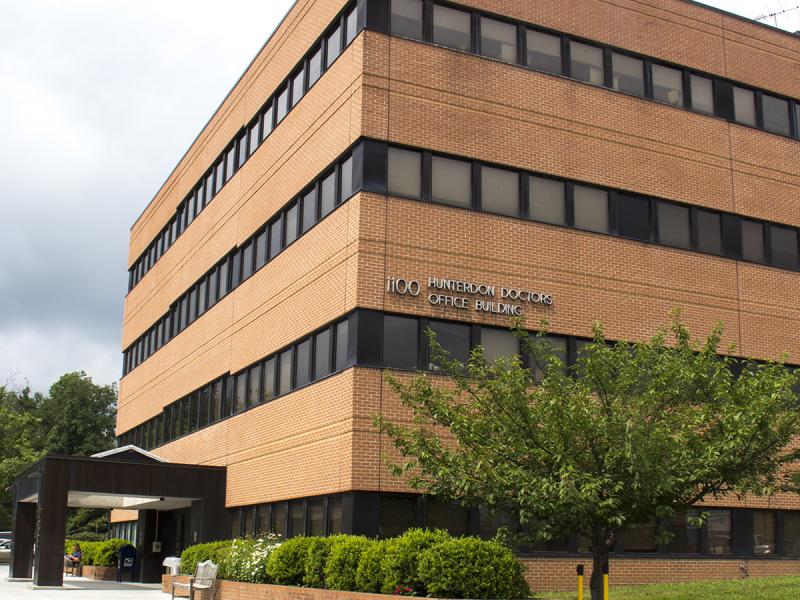
Conditions We Treat
Conditions We Treat
We provide patient-centered, evidence-based treatment and preventative management of a comprehensive range of all digestive disorders/conditions and adhere to nationally endorsed guidelines.
Prevention and Screening
Colon and rectal cancer screening (colonoscopy) is a way in which doctors check the colon and rectum for signs of cancer or growths (called polyps) that might become cancer. It is done in people who have no symptoms and no reason to think they have cancer. The goal is to find and remove polyps before they become cancer, or to find cancer early, before it grows, spreads, or causes problems. Doctors recommend that most people begin having colon cancer screening at age 45. People who have an increased risk of getting colon cancer sometimes begin screening at a younger age. That might include people with a strong family history of colon cancer, and people with diseases of the colon called “Crohn’s disease” and “ulcerative colitis.”
Barrett’s esophagus is a condition that affects the esophagus (the tube that carries food from the mouth to the stomach). When people have Barrett’s esophagus, the normal cells in the lower part of their esophagus are replaced by a different type of cell. Barrett’s esophagus is usually caused by acid reflux. Acid reflux is when the acid that is normally in your stomach backs up into the esophagus. Many people with acid reflux never get Barrett’s esophagus, but some do. If you have had acid reflux for a long time, it’s important to know if you also have Barrett’s esophagus. That’s because Barrett’s esophagus can later turn into pre-cancer or cancer of the esophagus. This can be diagnosed with an upper endoscopy.
Conditions and Diseases
Gastroesophageal reflux, also known as acid reflux, occurs when the stomach contents reflux or back up into the esophagus and/or mouth. Reflux is a normal process that occurs in healthy infants, children, and adults. Most episodes are brief and do not cause bothersome symptoms or complications. In contrast, people with gastroesophageal reflux disease (GERD) experience bothersome symptoms as a result of the reflux. Symptoms can include heartburn, regurgitation, vomiting, and difficulty or pain with swallowing. The reflux of stomach acid can adversely affect the vocal cords causing hoarseness or even be inhaled into the lungs (called aspiration).
The HET System is a non-surgical technology that allows physicians at Advanced Gastroenterology & Nutrition to treat internal hemorrhoids in a single procedure. It is a gentle, simple, and efficient procedure, associated with rapid recovery, with little to no discomfort and excellent results.
Hemorrhoids are a collection of veins in the anorectal junction which often become swollen and inflamed by childbirth, chronic constipation, aging, genetic predisposition and jobs involving extensive sitting such as, truck drivers, pilots, etc. The most common symptoms of hemorrhoids are itching or discomfort, rectal bleeding/spotting, and prolapse during bowel movements. While not life-threatening, hemorrhoids can have a significant impact on an individual’s quality of life. Seventy-five percent of all people have symptomatic hemorrhoids at some point in their lives, and 50% of people over the age of 50 suffer from chronic, progressively worsening hemorrhoid problems.
The HET system is a single-use, disposable device that applies a combination of gentle hemorrhoid tissue compression and low thermal energy to significantly shrink internal hemorrhoids. This treatment is having a dramatic impact on patients who suffer from hemorrhoids. Soon after treatment, there is already a prompt reduction in hemorrhoid size and a steady improvement in the patient’s symptoms over the ensuing several days.
Historically, hemorrhoid sufferers have been treated with topical steroid agents or suppositories which have short-lived benefits. Other historic treatments include rubber banding which dates back to the 1950’s. This treatment causes ulcerations in the rectum, requires multiple treatments and can be remarkably painful. “The problem is that many patients cannot tolerate the pain of constant pressure on the hemorrhoid and the discomfort. Since most patients have multiple enlarged symptomatic hemorrhoids, the procedure needs to be repeated several times over a few months. Hemorrhoid surgery is typically miserable or horrible. The HET system allows us to treat most patients with a less than a ten-minute procedure that has little to no post-treatment discomfort, and is a one and done intervention,” stated Jeffrey Hartford, MD, gastroenterologist at Advanced Gastroenterology & Nutrition.
Dr. Hartford is a national authority on HET having performed more procedures and helped launch the technology as a consultant. He has shared his clinical expertise with physicians around the country on this new technology. Advanced Gastroenterology & Nutrition is the only gastroenterology practice in Hunterdon County to provide this procedure to patients.
Crohn’s disease is an autoimmune disorder that can affect the entire digestive tract. The most common symptoms are diarrhea, belly pain, feeling tired, weight loss, and fever. Some people with Crohn's disease also get mouth sores, skin rashes, joint pain, and eye redness. Ulcerative colitis is also an autoimmune disorder that affects the large intestine or colon. Ulcerative colitis is a condition that causes diarrhea, belly pain, and bloody bowel movements. These symptoms happen because the large intestine becomes inflamed and gets sores, called “ulcers. Both these conditions are a lifelong disease that can be managed effectively with medications.
Irritable bowel syndrome (IBS) is a chronic condition of the digestive system. Its primary symptoms are abdominal pain and altered bowel habits (eg, constipation and/or diarrhea), but these symptoms have no identifiable cause. IBS is the most commonly diagnosed gastrointestinal condition and is second only to the common cold as a cause of absence from work. Studies suggest that about 12 percent of people in the United States have IBS. Many treatments and therapies are available for irritable bowel syndrome.
- Pancreatic diseases – Acute/chronic pancreatitis, Autoimmune pancreatitis, Pancreatic cancer/tumors, and Pancreatic Insufficiency.
- Liver diseases – Fatty liver disease (NAFLD: Nonalcoholic fatty liver disease), (NASH: Nonalcoholic steatohepatitis), Viral hepatitis (Hepatitis A, B, and C), Genetic liver disease (Autoimmune hepatitis, Alpha-1-Antitrypsin, Hemochromatosis, Wilson’s disease, etc.) and alcohol-induced liver injury.
- Cirrhosis is a disease in which the liver becomes severely scarred, usually as a result of many years of continuous injury. The most common causes of cirrhosis include alcohol abuse, chronic Hepatitis B or C (viral infections that affect the liver), and fatty liver disease (often seen in people with obesity or diabetes). In its advanced stages, cirrhosis is usually irreversible, so treatment may involve liver transplant. In its earlier stages, cirrhosis may be reversible if the underlying cause can be treated.
Celiac disease is a condition that causes a variety of symptoms like diarrhea, weight loss, bloating, stomach pain, and a lack of appetite. These symptoms occur because the immune system responds abnormally to a protein found in certain foods, like wheat, rye, barley, and prepared foods. These proteins are called gluten. Celiac disease is also known as gluten-sensitive enteropathy, celiac sprue, and nontropical sprue, all terms that identify the injury to the lining of the small intestine. The small intestine is responsible for absorbing food and nutrients. Thus, if the immune system damages the lining of the small intestine, this can lead to problems absorbing important nutrients from foods; this problem is referred to as malabsorption. Although celiac disease cannot be cured, strict avoidance of foods that contain gluten usually reverses the damage to the intestinal lining and stops associated symptoms, like diarrhea.
GI Bleeding can be from multiple sources typically separated into two categories Upper GI bleeding and Lower GI bleeding.
- Upper GI bleeding: Ulcers (stomach/intestine) which can be caused by NSAIDs (ibuprofen, naproxen, aspirin, etc.) and H. pylori (bacterial infection), AVM (arteriovenous malformation), Varices (esophageal/gastric) which are typically due to cirrhosis or liver disease, severe inflammation (esophagitis/gastritis), masses/cancer, etc.
- Lower GI bleeding: Diverticulosis (small pockets that develop in your colon), AVM (arteriovenous malformation), hemorrhoids, ulcers (colon), masses/cancer, etc.
Gallstones (cholelithiasis) are very common, affecting 10 to 15 percent of the U.S. population, which is almost 25 million people. About a quarter of the nearly 1 million people diagnosed with gallstones each year will need to be treated, usually with surgery. Most gallstones don’t cause blockages and are painless, also called “silent” gallstones. Silent gallstones usually don’t need medical treatment. In some cases, however, gallstones cause pain or other complications and must be treated, usually by removing the entire gallbladder with its stones. Occasionally gallstones can also cause blockages in the bile duct that requires a special procedure called an ERCP (Endoscopic retrograde cholangiopancreatography) to remove the stone causing the blockage.
Small intestinal bacterial overgrowth (SIBO) is a condition in which the small bowel is colonized by excessive aerobic and anaerobic microbes that are normally present in the colon. The majority of patients with SIBO present with bloating, flatulence, abdominal discomfort, or diarrhea. SIBO can cause maldigestion of carbohydrates, fats and proteins. In addition it can lead to Vitamin B12 deficiency.


